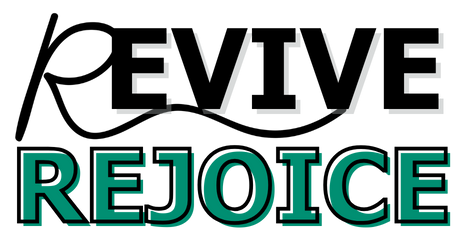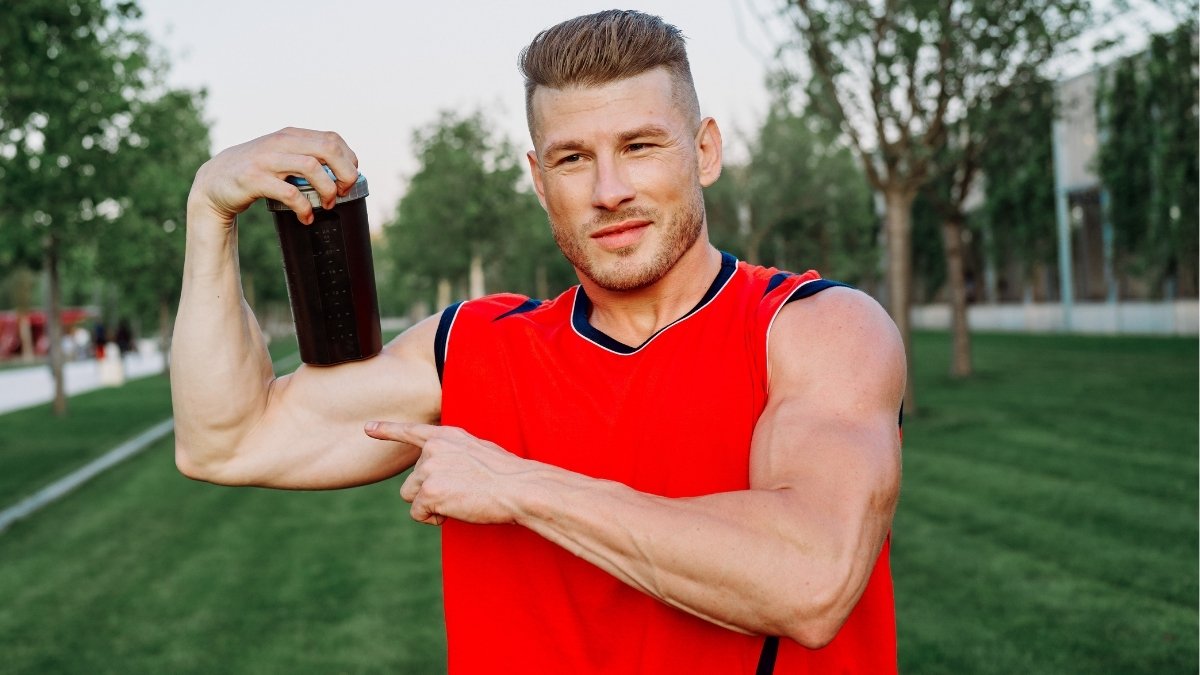The Male Testosterone Crisis: 12 Foods That Boost Testosterone Naturally (Urologists Recommend These)
By age 40, men lose approximately 1-2% of their testosterone annually—but your kitchen might hold part of the solution. Declining testosterone levels often manifest as persistent fatigue, reduced muscle mass, and decreased vitality that significantly impact daily life.
While this hormonal decline is natural, emerging research reveals that foods that boost testosterone naturally may offer valuable natural testosterone support. This comprehensive, evidence-based guide explores twelve scientifically-backed nutritional strategies that may help support healthy testosterone levels.
However, always consult qualified healthcare providers before making significant dietary changes, as nutrition supplements—not replaces—professional medical care for hormonal health concerns.
📉 Understanding Testosterone Decline
⚠️ Common Low Testosterone Symptoms
📅 Age-Related Decline Timeline
🧬 The Science Behind Food and Testosterone
🔬 Key Testosterone-Supporting Nutrients
⚙️ How Nutrition Supports Testosterone Production
Zinc-Rich Powerhouses
1. Oysters
Oysters pack more zinc than any other food. Just six medium oysters give you 32 mg of zinc. That’s almost three times what you need daily.
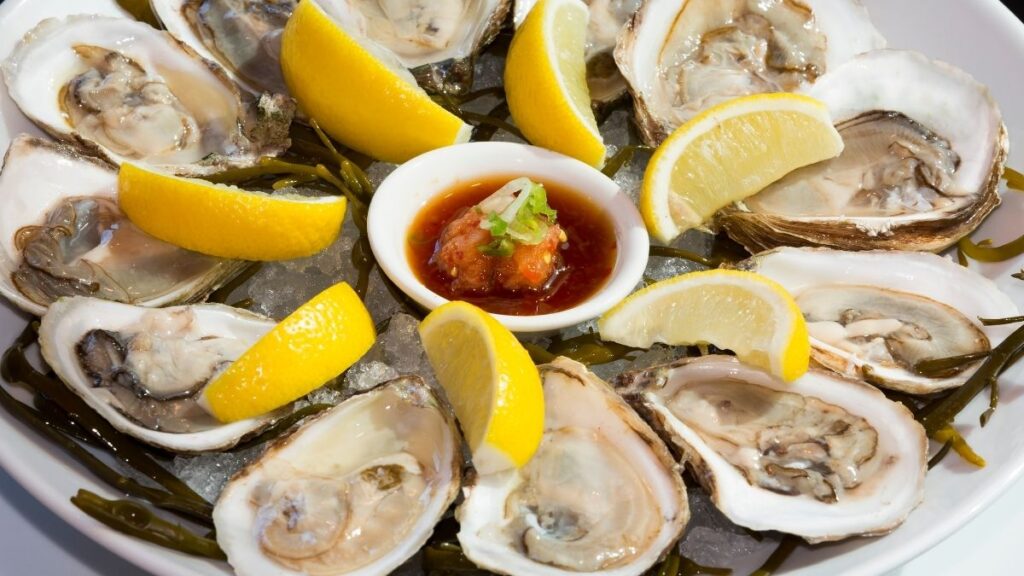
Why does this matter? Zinc helps your body make testosterone. Studies show men with low zinc have low testosterone too. When researchers gave zinc supplements to men with low levels, their testosterone went up by 93% in some cases.
Your body absorbs zinc from oysters better than from pills. The zinc in oysters comes with other nutrients that help your body use it well.
Don’t like raw oysters? Try them grilled with garlic and herbs. Baked oysters with breadcrumbs work too. Canned oysters are cheaper and still packed with zinc. Add them to pasta or salads.
Start with 3-6 oysters twice a week. More isn’t always better with zinc. Too much can actually hurt testosterone production.
2. Pumpkin Seeds
One ounce of pumpkin seeds gives you 2.2 mg of zinc. They’re also loaded with magnesium, which helps testosterone work better in your body.
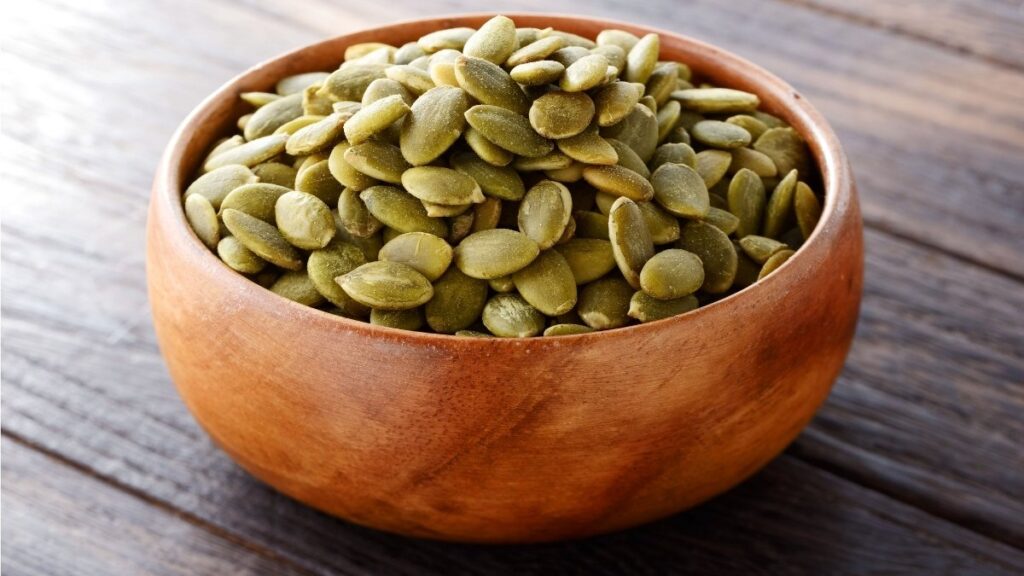
Research shows men who eat more magnesium have higher testosterone. Pumpkin seeds are one of the best magnesium sources around.
Eat them raw as a snack. Roast them with sea salt for crunch. Sprinkle them on salads or yogurt. Blend them into smoothies. Keep a small bag in your car or desk drawer.
Aim for 1-2 ounces daily. That’s about a handful.
3. Beef (Grass-Fed)
Grass-fed beef gives you zinc, protein, and healthy fats in one package. A 3-ounce serving provides about 5 mg of zinc plus all the amino acids your body needs to make hormones.
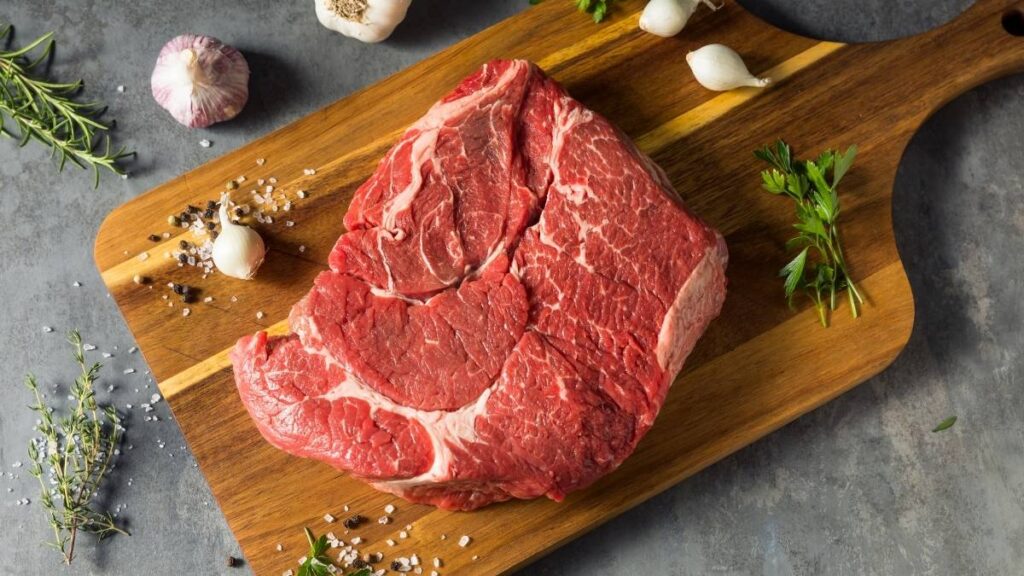
Grass-fed beef has more omega-3 fats than regular beef. These fats help reduce inflammation, which can hurt testosterone production.
Choose grass-fed when you can afford it. Regular beef still provides zinc and protein if grass-fed isn’t in your budget.
Keep portions reasonable. About 3-4 ounces is enough. That’s roughly the size of your palm.
Healthy Fat Sources
1. Extra Virgin Olive Oil
Your body needs fat to make testosterone. Extra virgin olive oil provides monounsaturated fats that support hormone production.
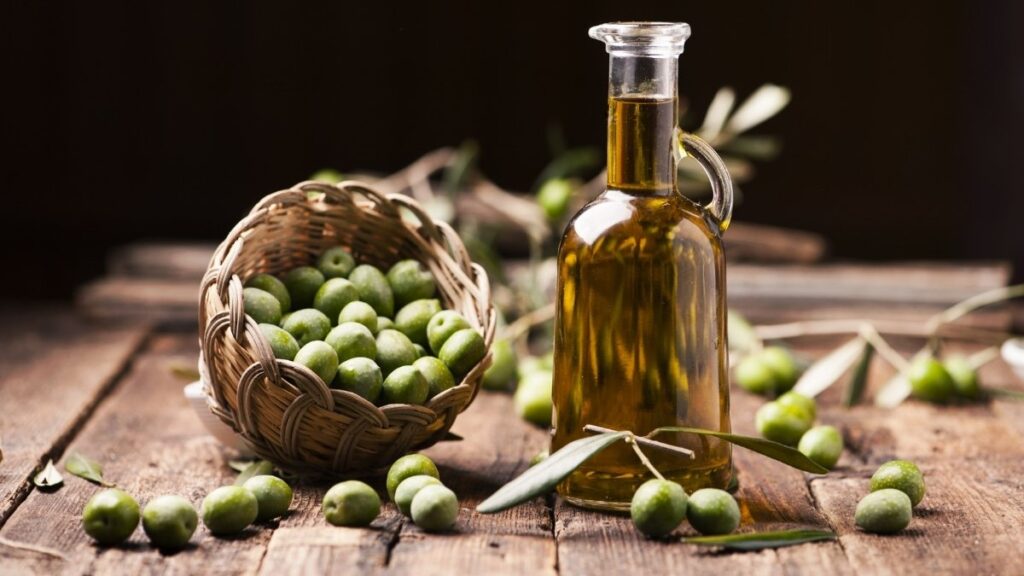
Studies on the Mediterranean diet show men who eat more olive oil have higher testosterone. One study found men who switched to extra virgin olive oil saw testosterone increases of 17-19% in just three weeks.
Use it for cooking at low heat. Drizzle it on salads. Add it to smoothies for extra calories. Don’t heat it too high or you’ll destroy the good compounds.
Aim for 2-3 tablespoons daily.
2. Avocados
Avocados are packed with monounsaturated fats, potassium, and vitamin K. These nutrients work together to support healthy hormone levels.
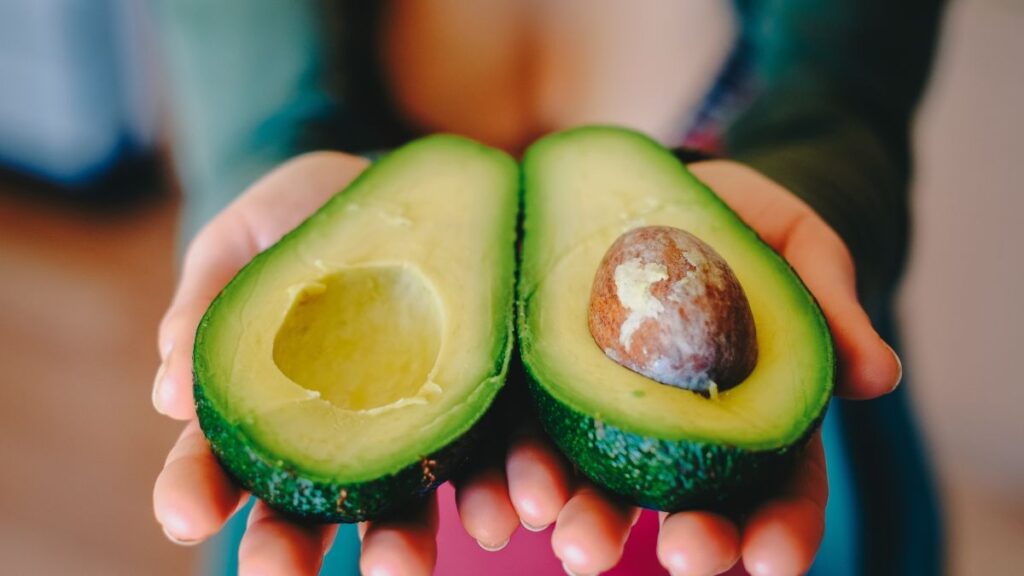
They also contain compounds that help reduce stress hormones. High stress hormones can block testosterone production.
Eat half an avocado daily. Add slices to eggs. Make guacamole. Blend them into smoothies for creaminess. Use them instead of mayo on sandwiches.
3. Fatty Fish (Salmon, Sardines)
Fatty fish like salmon and sardines provide omega-3 fats and vitamin D. Both are crucial for testosterone production.
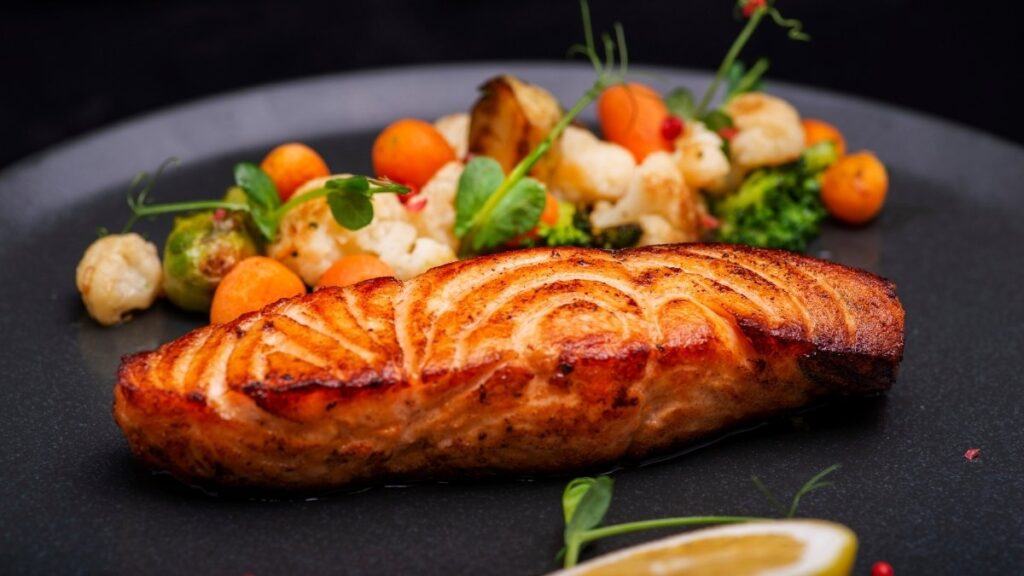
Wild salmon has more omega-3s than farmed salmon. But farmed salmon is still a good choice if wild is too expensive. Sardines are cheap and loaded with both omega-3s and vitamin D.
Studies show men with higher vitamin D levels have more testosterone. Many people don’t get enough vitamin D, especially in winter.
Eat fatty fish 2-3 times per week. A serving is about 3-4 ounces. Grill it, bake it, or eat sardines straight from the can.
Canned salmon and sardines are budget-friendly options. Look for wild-caught when possible.
Antioxidant-Rich Options
1. Pomegranates
Pomegranates are full of antioxidants that protect your testosterone-making cells from damage. Free radicals can hurt the cells that produce hormones.
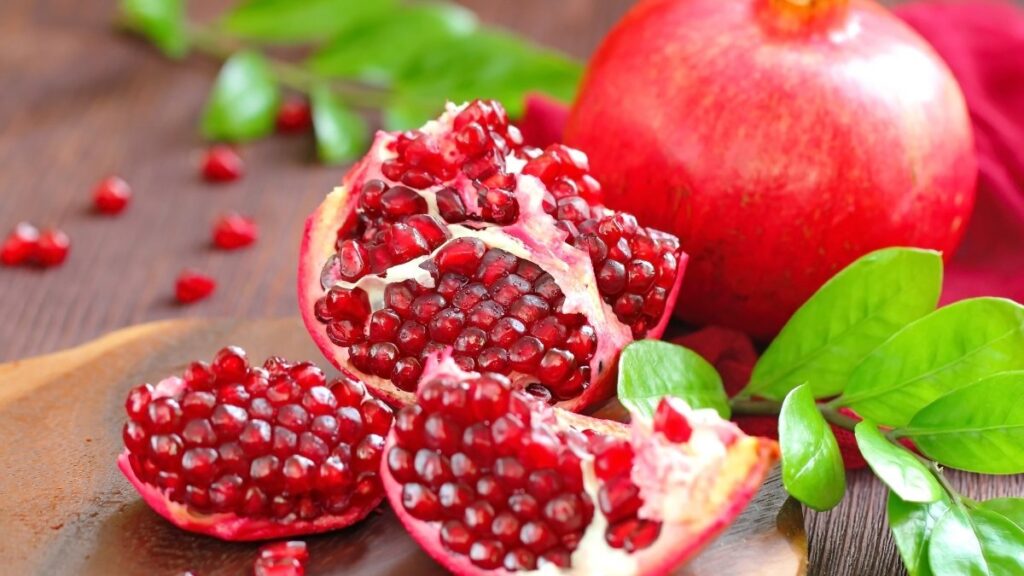
One study gave men pomegranate juice daily for two weeks. Their testosterone levels went up by 24%. Their mood and blood pressure improved too.
Eat the seeds fresh or drink 100% pomegranate juice. Avoid juice with added sugar. Fresh seeds work great in salads, yogurt, or oatmeal.
About 1/2 cup of seeds or 4 ounces of juice daily is enough.
2. Dark Leafy Greens
Spinach, kale, and other dark greens provide magnesium and nitrates. Magnesium helps testosterone work better. Nitrates improve blood flow, which helps hormones reach their targets.
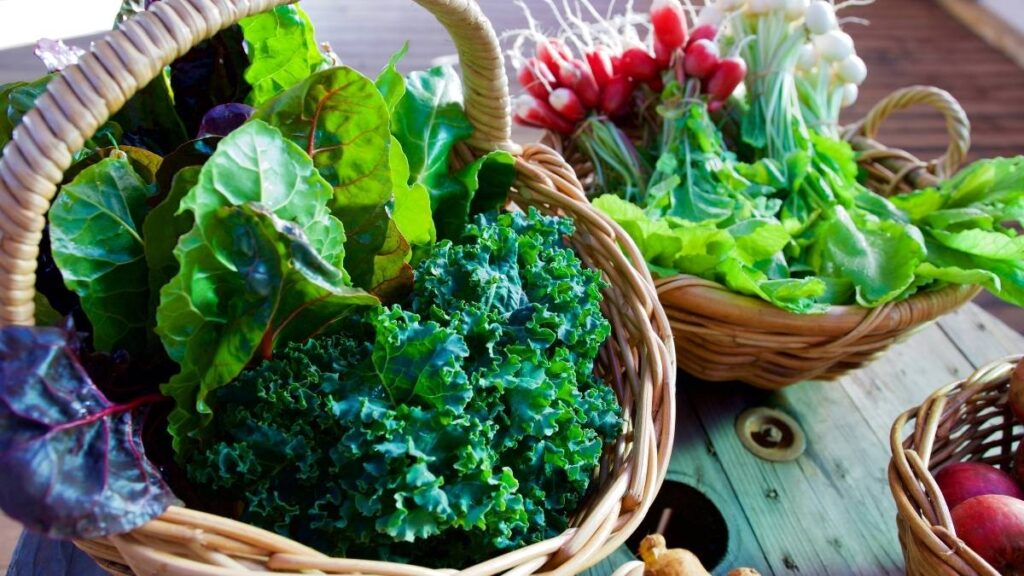
Men who eat more magnesium typically have higher testosterone levels. Dark greens are also low in calories, which helps you maintain a healthy weight. Being overweight can lower testosterone.
Add greens to smoothies. Sauté them with garlic. Use them as salad bases. Aim for 1-2 cups daily.
Traditional Supporters
1. Eggs (Whole)
Whole eggs provide cholesterol, which your body uses to make testosterone. Don’t worry about dietary cholesterol. Your body makes most of its cholesterol anyway.
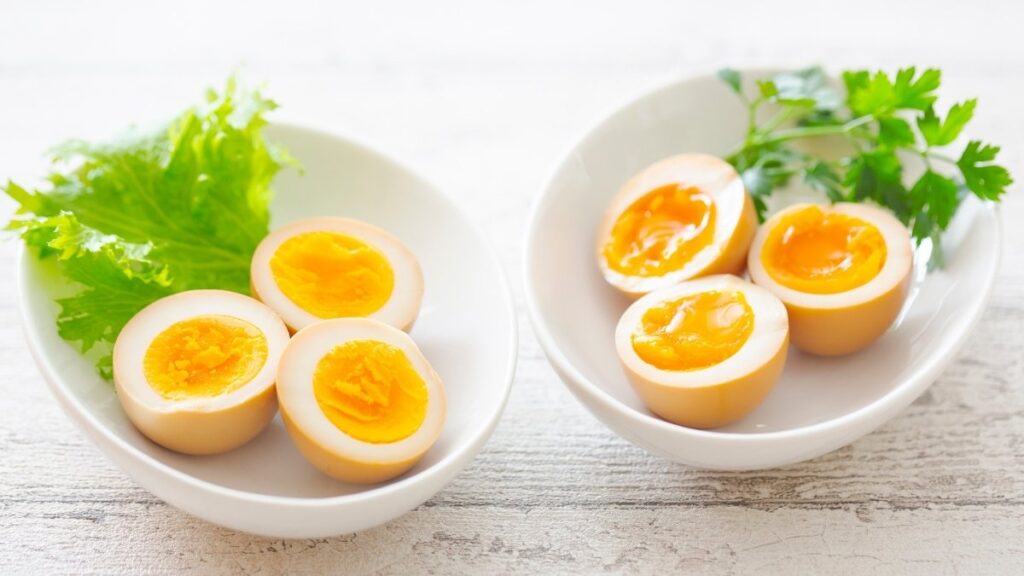
Eggs also give you high-quality protein and vitamin D. The yolk contains most of the nutrients, so don’t skip it.
Choose pasture-raised eggs when possible. These have more omega-3s and vitamin D than regular eggs.
Eat 1-3 whole eggs daily. Scramble them, make omelets, or hard-boil them for snacks.
2. Garlic
Garlic contains allicin, a compound that may help regulate hormone production. Some studies suggest garlic can help reduce cortisol, a stress hormone that blocks testosterone.
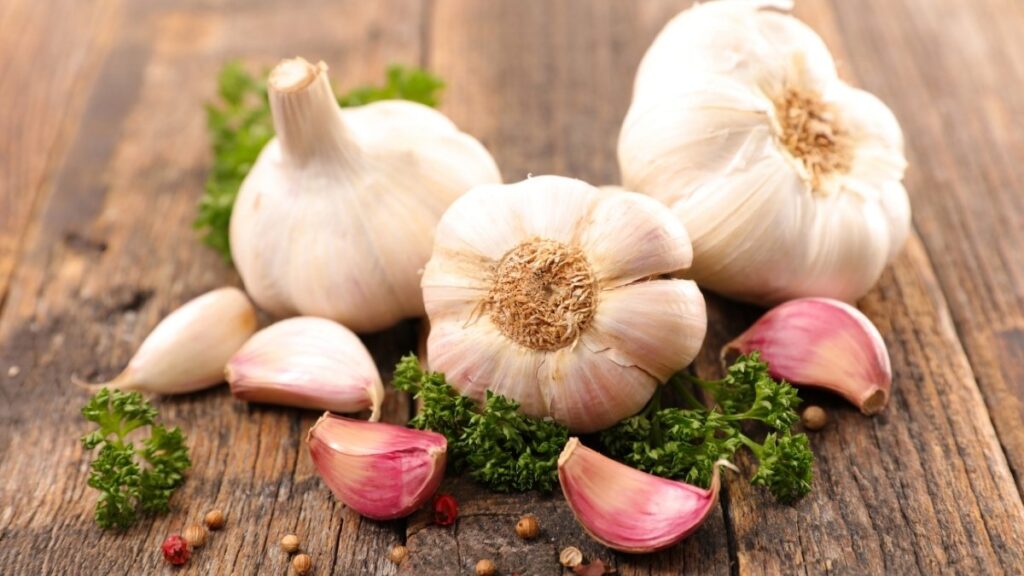
Animal studies show garlic can boost testosterone production. Human studies are limited but promising.
Use fresh garlic in cooking. Add it to stir-fries, roasted vegetables, or salad dressings. Aim for 1-2 cloves daily.
Let chopped garlic sit for 10 minutes before cooking to activate the allicin.
3. Ginger
Ginger fights inflammation throughout your body. Chronic inflammation can hurt testosterone production.
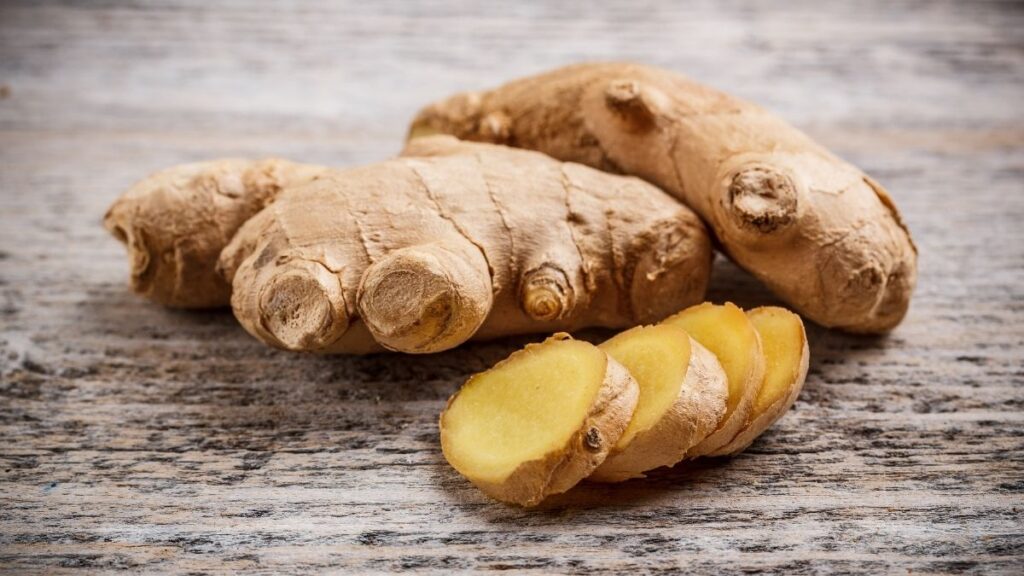
Studies show ginger supplements can increase testosterone levels. One study found a 17% increase after three months.
Add fresh ginger to smoothies or tea. Use it in stir-fries and curries. About 1 teaspoon of fresh ginger daily is enough.
4. Brazil Nuts
Brazil nuts are loaded with selenium, a mineral that supports thyroid function. Your thyroid and testosterone work together. Poor thyroid function can lower testosterone.
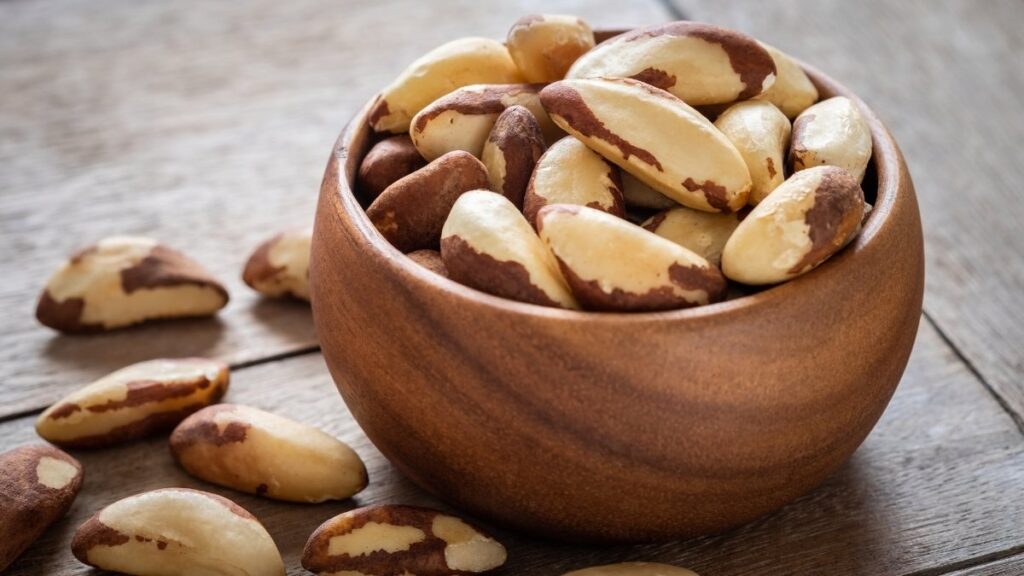
Just 1-2 Brazil nuts give you all the selenium you need for the day. Don’t eat more than that. Too much selenium can be harmful.
Eat them as a snack or chop them into salads. Store them in the fridge to keep them fresh.
Creating a Testosterone-Supporting Meal Plan
Building a diet for low testosterone doesn’t have to be complicated. Focus on getting the right nutrients at the right times.
Start Your Day Strong
Begin with protein and healthy fats. Try scrambled eggs with avocado and spinach. Or make a smoothie with protein powder, berries, and olive oil. This combination helps stabilize blood sugar and provides hormone-building nutrients.
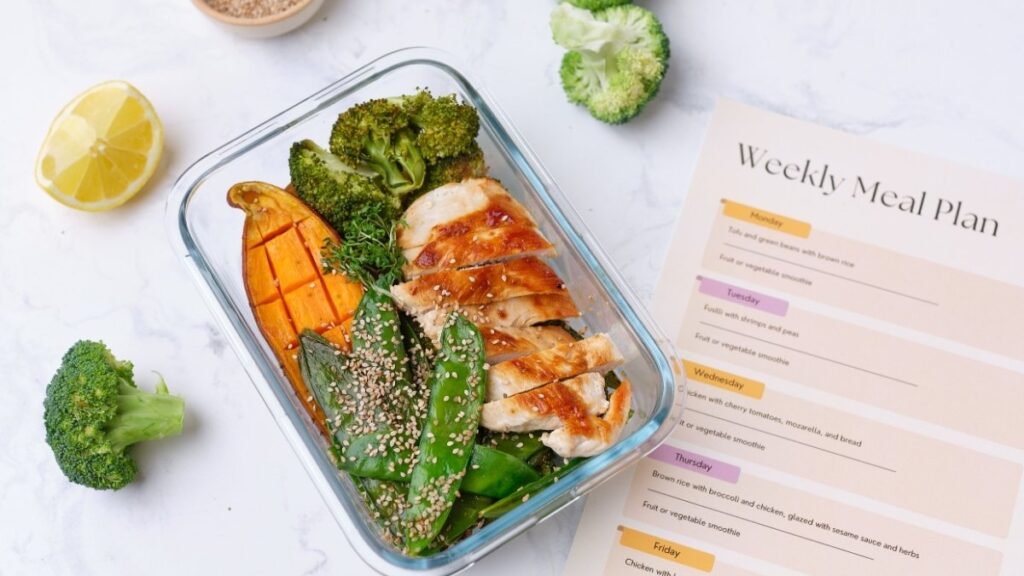
Avoid sugary cereals and pastries. These spike insulin, which can lower testosterone throughout the day.
Power Up Your Lunch
Include a zinc-rich protein source. Grass-fed beef with a side salad works well. Or try salmon with roasted vegetables drizzled in olive oil. Add pumpkin seeds to your salad for extra zinc and crunch.
Keep portions moderate. Large meals can make you sluggish and affect hormone production.
Smart Dinner Choices
Keep dinner lighter but nutrient-dense. Grilled fish with dark leafy greens is perfect. Add garlic and ginger for flavor and hormone support.
Eat dinner at least 3 hours before bed. This gives your body time to digest and helps improve sleep quality, which is crucial for testosterone production.
Snack Wisely
Choose snacks that support hormone production. A handful of Brazil nuts provides selenium. Pomegranate seeds give you antioxidants. Hard-boiled eggs offer protein and cholesterol.
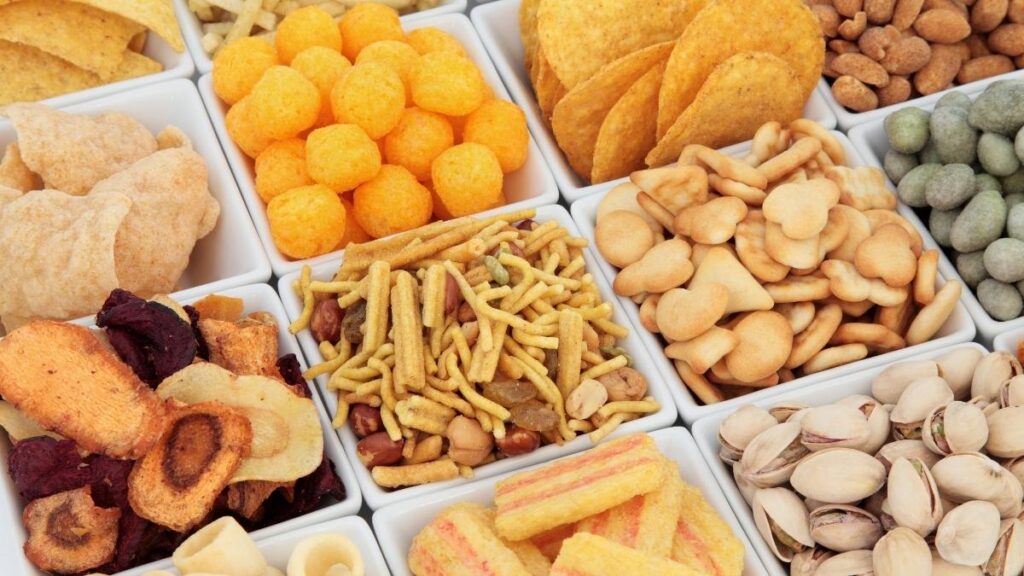
Timing Matters
Eat protein at every meal. This provides amino acids for hormone production throughout the day. Space meals 3-4 hours apart to maintain steady blood sugar.
Your Testosterone Meal Plan Template
Breakfast: 2-3 eggs with spinach and avocado
Snack: 1-2 Brazil nuts and pomegranate seeds
Lunch: Grass-fed beef salad with pumpkin seeds and olive oil dressing
Snack: Greek yogurt with chopped garlic (if you can handle it)
Dinner: Grilled salmon with ginger-sautéed greens
Combination Strategies
Pair zinc-rich foods with vitamin C to improve absorption. Add bell peppers to your beef dishes. Combine iron-rich foods like spinach with vitamin C sources too.
Mix healthy fats with your vegetables. This helps your body absorb fat-soluble vitamins like vitamin D.
Portion Guidelines
Protein: Palm-sized portion at each meal Healthy fats: 1-2 tablespoons per meal Vegetables: Fill half your plate Nuts and seeds: Small handful (about 1 ounce)
Remember, consistency matters more than perfection. Start by adding 2-3 of these foods to your current diet. Then gradually build from there.
Lifestyle Factors That Enhance Nutritional Benefits
The foods that boost testosterone naturally work better when combined with the right lifestyle choices. Think of nutrition and lifestyle as teammates working toward the same goal.
Exercise and Diet Work Together
Strength training boosts testosterone production. When you combine weightlifting with testosterone boosting foods, you get better results than either approach alone.
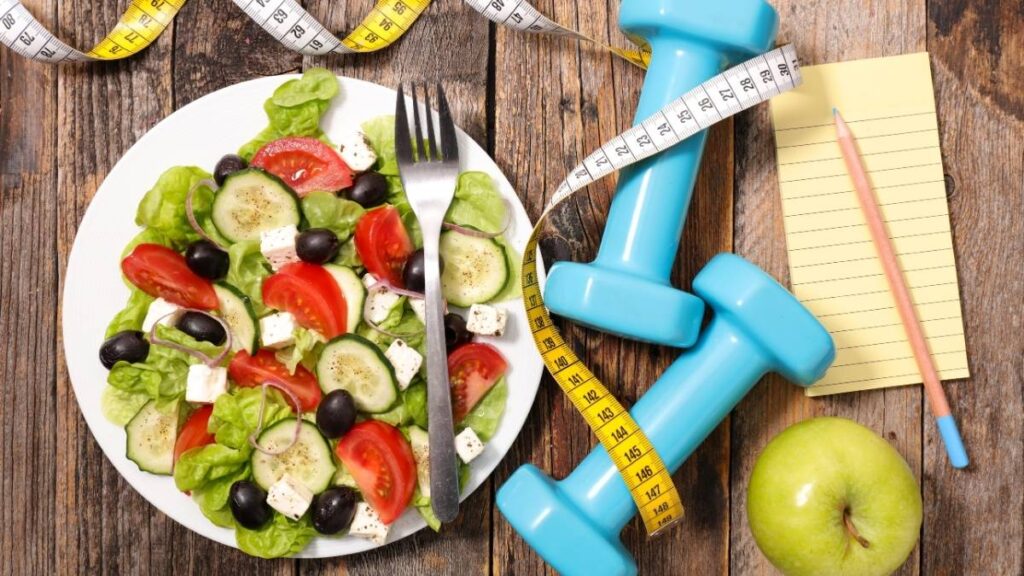
Eat protein within 2 hours after working out. This helps your muscles recover and supports hormone production. A post-workout meal with eggs and avocado is perfect.
Avoid long cardio sessions on an empty stomach. This can actually lower testosterone. If you do cardio, eat something small beforehand.
Sleep Quality Makes or Breaks Your Progress
Poor sleep can cut your testosterone production by 15% or more. It doesn’t matter how well you eat if you’re not sleeping.
Stop eating large meals 3 hours before bed. Heavy digestion can disrupt sleep. A small snack with protein and fat is okay if you’re hungry.

Keep your bedroom cool and dark. This helps your body produce more growth hormone and testosterone during deep sleep phases.
Aim for 7-9 hours nightly. Your body makes most of its testosterone while you sleep.
Stress Management Is Critical
Chronic stress raises cortisol, which blocks testosterone production. The best foods in the world can’t overcome constant stress.
Try meditation, deep breathing, or yoga. Even 10 minutes daily helps lower stress hormones.
Avoid news and social media before bed. These can spike stress hormones when you should be winding down.
Habits That Hurt Your Progress
Drinking too much alcohol lowers testosterone. Limit yourself to 1-2 drinks on weekends if you choose to drink.
Smoking damages blood vessels and hurts hormone production. If you smoke, quitting is one of the best things you can do for your testosterone.
Eating too much sugar spikes insulin, which can lower testosterone. Focus on whole foods instead of processed ones.
Being overweight or underweight both hurt hormone production. Use the foods in this guide to reach and maintain a healthy weight.
Simple Daily Habits That Help
Get sunlight in the morning. This helps regulate your circadian rhythm and supports vitamin D production.
Take short walks after meals. This helps control blood sugar and reduces stress.
Stay hydrated but don’t overdo it. Too much water can dilute important minerals.
When to Seek Professional Help
Food can help support healthy testosterone levels, but sometimes you need more than dietary changes. Here’s when to talk to a doctor.
Warning Signs You Shouldn’t Ignore
Extreme fatigue that doesn’t improve with better sleep and nutrition might signal very low testosterone. If you’re sleeping 8+ hours and eating well but still feel exhausted, get tested.
Complete loss of interest in sex, especially if it happens suddenly, warrants medical attention. While stress and poor diet can affect libido, a sudden change might indicate a hormone problem.
Significant muscle loss despite eating protein and exercising could mean your testosterone is too low to maintain muscle mass.
Mood changes like depression, anxiety, or irritability that persist despite lifestyle improvements need professional evaluation.
Types of Healthcare Providers to Consult
Your primary care doctor can order basic testosterone tests and rule out other health issues. They’re a good starting point.
Endocrinologists specialize in hormones and can provide more detailed testing and treatment options.
Urologists also treat male hormone issues and can address related concerns.
Testing Options
A simple blood test can measure your testosterone levels. The best time to test is in the morning when levels are highest.
Total testosterone shows how much hormone you have overall. Free testosterone measures how much is available for your body to use.
Your doctor might also test other hormones like thyroid hormones, cortisol, and vitamin D levels.
Integrating Nutrition with Medical Treatment
If your doctor recommends hormone therapy, keep eating testosterone-supporting foods. Good nutrition helps any treatment work better.
Some medications can affect nutrient absorption. Ask your doctor if you need to adjust your diet or take supplements.
Don’t stop eating well just because you’re getting medical treatment. The foods in this guide provide benefits beyond just testosterone support.
Conclusion
Your testosterone levels don’t have to decline with age or stress. The right foods can help your body maintain healthy hormone production naturally.
Start small. Pick 2-3 foods from this list and add them to your weekly routine. Maybe it’s having eggs for breakfast twice a week or snacking on pumpkin seeds. Small changes add up over time.
Remember that food is just one piece of the puzzle. Good sleep, regular exercise, and stress management all work together with nutrition to support healthy testosterone levels.
Don’t expect overnight changes. It takes several weeks to see improvements in energy, mood, and other testosterone-related symptoms. Be patient and consistent.
If you’re dealing with severe symptoms or haven’t seen improvement after 2-3 months of dietary changes, talk to your doctor. Sometimes medical evaluation is needed to rule out underlying health issues.
The foods that boost testosterone naturally also provide many other health benefits. You’ll likely notice improvements in energy, mood, and overall wellbeing as you add these nutrient-dense options to your diet.
Take action today. Choose one or two foods from this list and add them to your next grocery trip. Your future self will thank you for taking steps toward natural testosterone support now.

